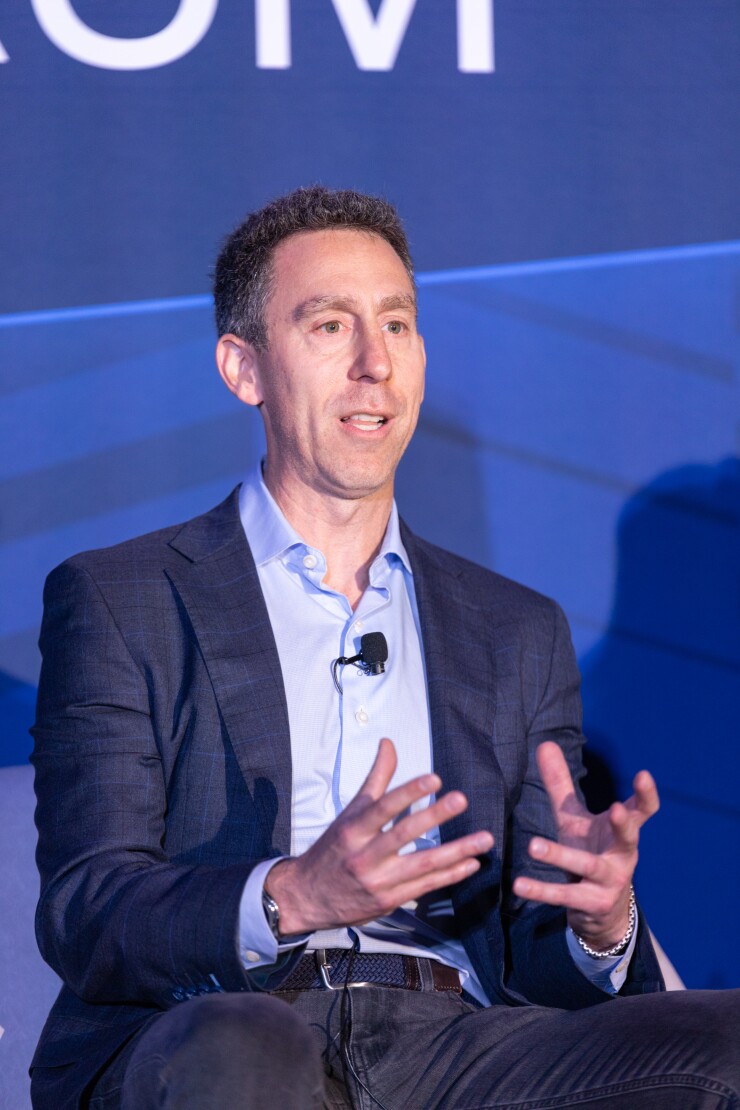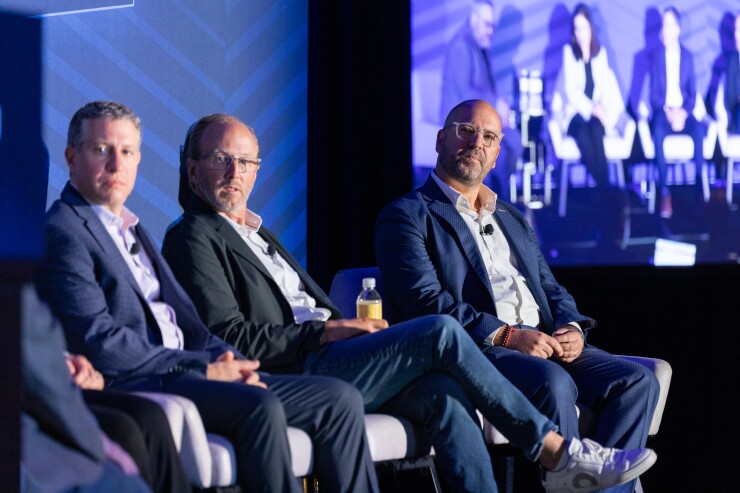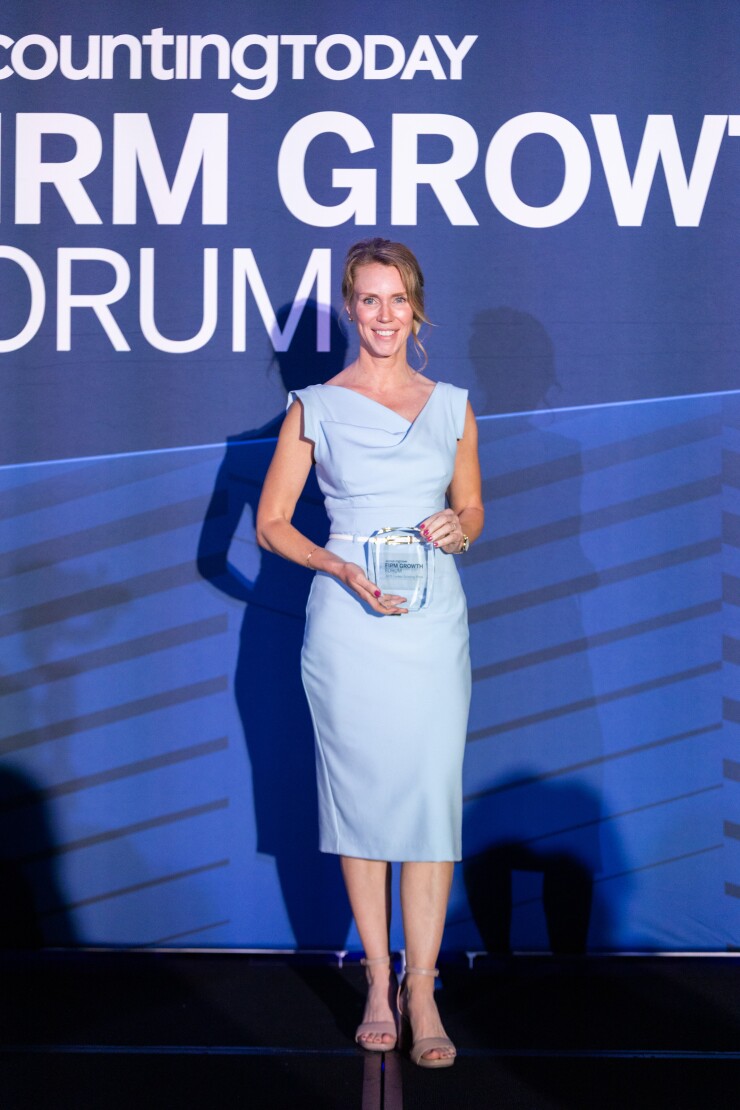The problem with growth —
In particular, the need to hire more people in a profession struggling to recruit and retain talent.

"It's always the people challenge in accounting right now," shared Jeremy Dubow, CEO of Chicago-based Prosperity Partners, the No. 2 Fastest-Growing Firm this year based on revenue increases over last year. "Everyone talks about it being a labor-constrained industry, and it certainly is, but it's not so much that it's labor constrained, it's how do we do the right things to keep our best people. ... Everyone talks about culture, but there is this question of what does it mean? What does culture exactly mean? And we think about it as how do we create the environment where our people want to be there, they want to achieve, they want to thrive. And if we're doing that, we end up overcoming the biggest challenge in this industry, which is how do you hire the best people and how do you keep them? And you keep them by creating the right environment to allow them to be successful. And I think we've done a really great job of that."
(Watch:
The reality is reflected in the numbers, according to Chad Anschuetz, CEO of Troy, Michigan-based Top 100 Firm Doeren Mayhew.
"I heard an amazing stat the other day. Our profession needs a 4% increase in accountants to be sustainable, yet we're experiencing a greater than 1% decline since 2019," he explained. "We've gone from over 2 million accountants down to 1.8 million, and not growing and actually declining. India actually has more accountants than the U.S., so the talent pool is shrinking and both the public and the private sectors are fighting for the same CPA and the same talent. And honestly, if we had 20 more experienced personnel, we would even have grown at a higher pace than 24%."
Alberto Guzman, partner at Coral Gables, Florida-based AbitOs, offered his own unofficial statistics when commenting "if we talk to a hundred firms, 99 will say the number one issue is staffing or people on the growth side."

PP&Co. is no exception to this, according to senior partner Ed Davis, who named both people and resources as challenges for the San Jose, California-based firm.
"We spent a lot of time making sure we had the resources and capabilities to service the growth once we get it," Davis said. "And so that was one of the big challenges. And then it's making sure that your processes are up to date, your training's up to date, as your workflow. As we get bigger and bigger and more and more clients, the complexities of the operational side gets a little bit more difficult and putting in the right people in place to take those over, to make those work effectively and efficiently."
(Watch:
Like PP&Co., Vancouver, Washington-based Opsahl Dawson also made sure to get a head start on the staffing constraints born of accelerated growth.
"You have got to have the capacity to do the great work and then you have to be able to get through the emotional aspects of change," advised CEO Aaron Dawson. "So staffing, you have got to have the right staff to be able to perform at the top level. You know your firm has to be desirable to the clients. … We build capacity by hiring ahead of our growth. You have to hire the person before you grow."
James Mahoney, CEO MahoneySabol, agreed that talent remains a professionwide issue, both in numbers and changing demographics.
"Probably the same thing that everybody's seeing," he said when asked about the biggest challenge facing the Glastonbury, Connecticut-based firm. "It's just just a lack of, really, of talent. You know, top people, younger people that maybe don't have the entrepreneurial spirit. Another thing I've noticed in the market is you don't see new accounting firms popping up. In my day, being an old-timer, I mean, it was very common for somebody to leave a big firm, start their own firm, and build it."
The talent-related concern for Omaha, Nebraska-based Bland & Associates is also an operational one, according to managing partner Jeremy Vokt.
"Obviously when you're 120 people, it all doesn't work out, or are they maybe in the right seat," he explained. "The one thing with traction and EOS [Entrepreneurial Operating System], they say is 'right person, right seat,' and that's just not having the right person in the firm. It could be, I may be good at one job, but I'm not sitting in that seat yet, so how do I get their talents to where they can flourish? In our firm, we had to have a few people like that in our firm where that was a challenge to get them in the right seat at that point. We've also had people that maybe didn't fill the skill sets that we needed, so how do we go find those skill sets?"

Those skill sets include the latest technology, Vokt continued.
"Technology. How do you find time for all that, especially the fast pace? Everything's happening right now. Yeah, we're growing, that's great, but you have got to find time to test these things out and implement technology and what that means. So it's kind of a double-edged sword there. The technology and the growth going together, that is a challenge with it."
Atlanta-based Top 100 Firm Smith + Howard has had to be proactive with its technology.
"I think the main challenges that we face in achieving this growth has more to do with the ability to continue to have the leaders step up in what they do and to have the systems support that growth," said CEO Sean Taylor. "And so you're always having to look ahead toward systems improvement ahead of when maybe you will ultimately need them to accompany that growth. So it's this ever evolving wheel of leadership development, leadership recruitment, and then systems upgrades."
Managing and messaging the change
Vokt and Taylor's Fastest-Growing Firm peers agreed that staying current on technology and all the attendant training requirements can present issues, along with myriad operational snags. Change management, then, is paramount for any high-growth firm, as Steve Stagner, CEO of No. 1 Fastest-Growing Firm Crete Professionals Alliance attests.
"I kind of sometimes feel like we're building the plane while we're flying it," Stagner said of the Top 100 Tampa, Florida-based firm and the several firms in PE-backed Crete's network. "So with the kind of rapid growth that we've had, I think the best way to describe the challenges are really in three different kinds of frameworks. One would be change management, although we're not mandating change. There's this balancing act between keeping your local culture, but then if you really want to access the talent and the tools and the technology, it's very important to get on common platforms. And so really just going through change management and these firms have deeply rooted memory, muscle memory, and systems and processes. And getting alignment with them has always been a challenge."
(Watch:
Effectively managing change means keeping what works and losing what doesn't, according to Jeffrey Rosen, managing partner at Towson, Maryland-based RS&F.
"It's been a lot of change over a period of time, and certainly as change goes, a lot of times people don't like that," he shared. "So we've had to go through different enhancements over time. We've had to adapt in some cases. We've had to scrap certain changes or processes that we've made. So that certainly has presented its shared challenges, I would say at times bumpy. But I think we've always done it, certainly with the right intent, and we have a team who kind of rolls with the punches and is all in."

Adapting to change requires as much of a mindset shift as an operational one, then. Albuquerque, New Mexico-based Top 100 Firm REDW has experienced success in the challenging area of recruitment, according to managing principal Steve Cogan, though that achievement requires clear messaging.
(Watch:
"I think the most interesting thing has been to change the culture of the firm and think about how we can have a growth mindset all the time," Cogan said. "One particular aspect of that is that as we've done talent acquisition, sometimes folks are worried or fearful that if we add some additional talent, it's somehow going to negatively impact their careers. And that if you have kind of a prosperity mindset and a growth mindset, well, we're all going to be more successful if we add great people to REDW. So we've done that really consistently."
Leaders of successful firms must then also communicate that their growth will not necessarily translate to outgrowth, especially on the client side.
"What ends up happening typically is a lot of clients just, out of not knowing, but just out of saying something: 'Oh, you're growing so much, you're probably outgrowing us,'" shared AbitOs' Alberto Guzman. "And it's not. It's the same firm. It's the same services. We just happen to do more of it. But that's a challenge. People will think that just because you're getting larger or you're growing, that your services are changing or that you're changing the firm or the culture and you really are not. You're just able to give more services and hopefully at the same rate, or even if it's a higher rate, hopefully you can give them better service or more service."
(Watch:
For Arlington, Virginia-based Top 100 Firm Ascend, communication was also a challenge, particularly representing its mission as a private equity-backed platform for firms.

"We came to firms with an idea that we wanted to save the middle-market firm while offering the resources of a very large firm, and I think a lot of people just weren't able to envision that at this point," explained vice president of partnerships Maureen Dillmore. "And there's also just kind of a negative connotation with PE. People have had experiences with it throughout other industries. Their clients have had experiences with it. And I think a lot of people just think that PE, once PE gets involved, it's all about bottom line. You lose your culture, people don't matter anymore. And so for us to come in and try to prove to be the opposite of that and show that we can be really people-forward amidst having the support of private equity backing, that was definitely a challenge when we first got started."
(Watch:
In a similar vein of strong messaging and branding, the people at the Fastest-Growing Firms must capitalize on their worth, which Jeanne Bernick empowers them to do as chief client officer at Top 100 Firm Pinion.
"The biggest challenge is really helping our internal accountants and technical experts understand their value," she explained. "So when you sit down and you've walked through a proposal for a client, they continually think, well, I could never charge that much. I'm not worth it. You know, I'm just doing a tax return or I'm just doing this. It's really coming around to our internal employees and saying, "It's not just [a tax return], you are worth this.'"
"What you're doing is saving a family business or it's improving the profitability of a business and so the value is there," she continued. "Helping our own internal people understand their value has been really interesting and challenging. But once we've started doing workshops around value, it's like they get it and it's a win-win for not only them but also the client, because it raises both sides. So I think that has been an interesting challenge."
(Watch:
As many of the Fastest-Growing Firms outlined their challenges, they recognized the opportunities among them. Specifically, ones that will continue their enormous growth trajectories.
As Stagner put it when describing Crete's efforts both internally and with its network of firms, "the flip side of that is there's tremendous opportunity if you go through the change-management process. All the firms… do so many things very well, but they do them very differently. And so it's very important to kind of harmonize those processes so that we can identify best practices and help them unlock growth."





